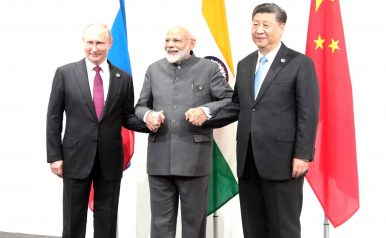By Andrey Panevin
 The Sino-Russian partnership has growing appeal for other countries (including India) as the West flounders.
The Sino-Russian partnership has growing appeal for other countries (including India) as the West flounders.
The most recent G-20 Summit in Osaka was an interesting affair. Not much of substance emerged from meetings involving Western leaders, including those with U.S. President Donald Trump. Instead, the most interesting aspects of the G-20 were Russian President Vladimir Putin’s interview with the Financial Times, given just prior to the start of the event, and the trilateral handshake between Russia, China, and India.
The former grabbed headlines due to Putin’s proclamation regarding the obsolescence of the Western liberal order; the latter was a strangely and unfortunately muted affair in terms of press coverage. India’s Prime Minister Narendra Modi has done what many thought he would not, extending a friendly hand to China at the most opportune time for Chinese President Xi Jinping’s Belt and Road Initiative and plans for transcontinental Eurasian integration.
The trilateral was a somewhat informal meeting held at the behest of Modi, who had pitched the idea while at the Shanghai Cooperation Organization (SCO) summit earlier in June. It came just as the United States has been growing ever more worried about Russia’s sale of S-400 air defense systems to Turkey and India, two nations that were perhaps taken for granted as being the major non-Western powers in the Western camp.
It also took place at a time when Putin and Xi have concluded their sixth meeting in just less than two months. They have discussed everything from Russia’s integration into the BRI, to security in the Middle East and Central Asia and the “de-dollarization” of trade. Putin and Xi have also made it quite clear that they believe that the Western liberal order has failed to answer the most pressing questions of our time. Russia and China, while not totally opposed to cooperation with the West, are ready to take charge of “global responsibility,” as Xi put it at the G-20. However, unlike the late 1990s and early 2000s, this mutual agreement is rather rapidly growing in appeal among other actors. Speaking at the SCO summit in June, Pakistan’s Prime Minister Imran Khan did not mince words when he declared that geopolitical power is shifting “eastwards” in a multipolar world, and that Pakistan is ready to take advantage of this shift.
Much was made about the remarks Putin made in the FT interview; however, not enough attention has been paid to the extraordinary statement, given after Putin’s meeting with Modi and Xi, regarding Russia, India, and China “laying the groundwork for [an] equal and indivisible security architecture in Eurasia.” This rhetoric gives even more weight to the continually underrated importance of institutions such as the SCO, the Conference on Interaction and Confidence Building in Asia (CICA) as well as the St. Petersburg and Eastern Economic Forums. The first three were all held in June and attended by Putin, Xi and Modi, and the fourth is slated for later this year with Modi being guest of honor at Putin’s invitation. These organizations and summits should no longer be seen as lesser to forums such as the G-20 or G-7; they are in fact growing exponentially in importance, while the “G” summits are at the very least experiencing a continued period of stagnation.
2019 is proving to be the year of a rapid resurgence in confidence and purpose among non-Western and non-liberal powers. Ostensibly catalyzed by the “asymmetric but equal” model of relations championed by Putin and Xi, we appear to be on the precipice of monumental change with regard to the post-Cold War status quo. The secretary general of the UN, Antonio Guterres, put it best when, speaking at the recent St. Petersburg Economic Forum, he rather remarkably stated that the Russia-based summit “embodies the 21st century truth: global challenges require global solutions…And that is why we are here.”
Andrey Panevin is a Ph.D. candidate at the University of Tasmania. His research interests include Sino-Russian rapprochement, the Belt and Road & Greater Eurasia initiatives, Eurasian integration and the role of US foreign policy in influencing these developments.
No comments:
Post a Comment